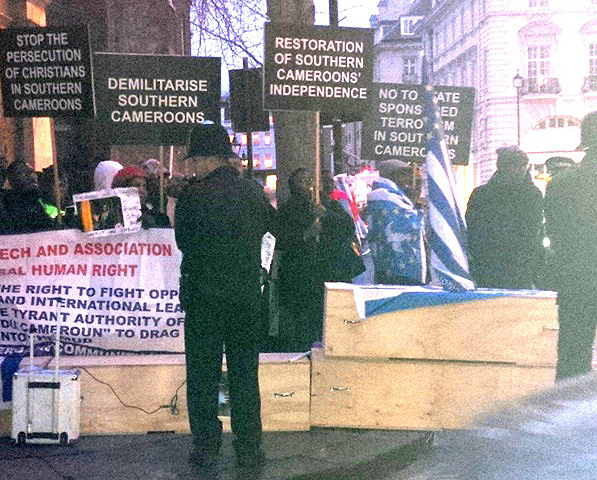 Southern Cameroon protest outside the Commonwealth Secretariat in 2018. [photo: Debbie Ransome]
Southern Cameroon protest outside the Commonwealth Secretariat in 2018. [photo: Debbie Ransome]
[This is an excerpt from an article in The Round Table: The Commonwealth Journal of Internatinal Affairs.]
Under the auspices of the United Nations, the transition from colonialism to independence was carried out in accordance with relevant rules of international law rooted in the right to self-determination. The exercise of a people’s rights to self-determination in post-colonial Africa has most often taken the trajectory of armed conflict rather than by treaty or diplomatic means (Anyangwe, 2018). Article 20 (2) of the African Commission on Human and Peoples’ Rights (2016) states that ‘colonized or oppressed peoples shall have the right to free themselves from the bonds of domination by resorting to any means recognized by the international community’. According to Ngang (2021), the right to self-determination is a collective privilege that guarantees freedom to observe and practice a wide range of liberties.
Further claims of Southern Cameroons’ right to self-determination have been based on oppression and massive human rights violations, democratic deficits, and political and economic discrimination and marginalisation. These rest on the relationship between the right to self-determination and respect for human rights. According to Nkongho (2015), the legal grounds for such arguments stem from the 1970 Declaration on Friendly Relations, which provides that ‘all peoples have the right freely to determine, without external interference, their political status and to pursue their economic, social and cultural development, and every state has the duty to respect this right in accordance with the provisions of the Charter’. This declaration limits the sovereignty of states; as such, claims to a right to secession or external self-determination can be made on the basis of gross and systematic violation of the fundamental human rights of groups of peoples, and the fact that a peaceful solution of the problem within the existing state structure is unlikely (Nkongho, 2015). Kosovo’s secession from Serbia is a good example of a case where persistent violation of intrastate autonomy agreements entered into with a minority group by the state led to the ruling by the ICJ in 2010 that the unilateral declaration of independence of Kosovo was within the confines of the law.
The Kosovo case can serve as a precedent for Southern Cameroons’ claims to independence. Given the injustices outlined above, a sub-state entity can unilaterally secede without the consent of the host state. However, symbolic proclamation of the independence of ‘Ambazonia’ by Southern Cameroons’ leaders on 1 October 2017 met with repression and gross violations of the human rights of Southern Cameroonians by the government of Cameroon. While this attempt failed, it does not erase the fact that the right to remedial secession can still be realised in accordance with the remedial right theory, which states that any group of people have a right to secede if they are subjected to severe injustice and if they feel that their existence is threatened (Buchanan, 1991). The case of South Sudan’s remedial secession is also an exemplar for Southern Cameroons. Dersso notes that the country’s independence symbolises ‘the emergence of a new human security-based approach for negotiating the tension between these principles and the opportunity this presents for a principled response to other claims for self-determination on the continent’ (Dersso, 2012).
International law plays a crucial role in protecting states’ territories. The 1970 Declaration on Friendly Relations gave precedence to ‘the territorial integrity or political unity of sovereign and independent states conducting themselves in compliance with the principle of equal rights and self-determination of peoples … It also reiterates that any interruption of the territorial integrity of other states is not allowed …’ Both the UN Charter and the African Union Charter of 1963 specify that exercising the right to self-determination is subject to consideration of the territorial integrity of states and the principle of uti possidetis, thus favouring internal self-determination. The Supreme Court of Canada’s ruling that Quebec was not entitled to exercise the right of unilateral secession (Supreme Court of Canada – Reference re Secession of Quebec [1998] 2 S.C.R. 217) is a classic example of protection of territorial integrity and endorsement of internal self-determination. Going by the Quebec case and the fact that the government of Cameroon is not willing to recognise the existence of an Anglophone problem in Cameroon, the peoples of Southern Cameroons’ claim for self-determination may continue to be overlooked.
Lukong Stella Shulika &Oluwaseun Tella are with the Institute for the Future of Knowledge, University of Johannesburg, Johannesburg, South Africa.



